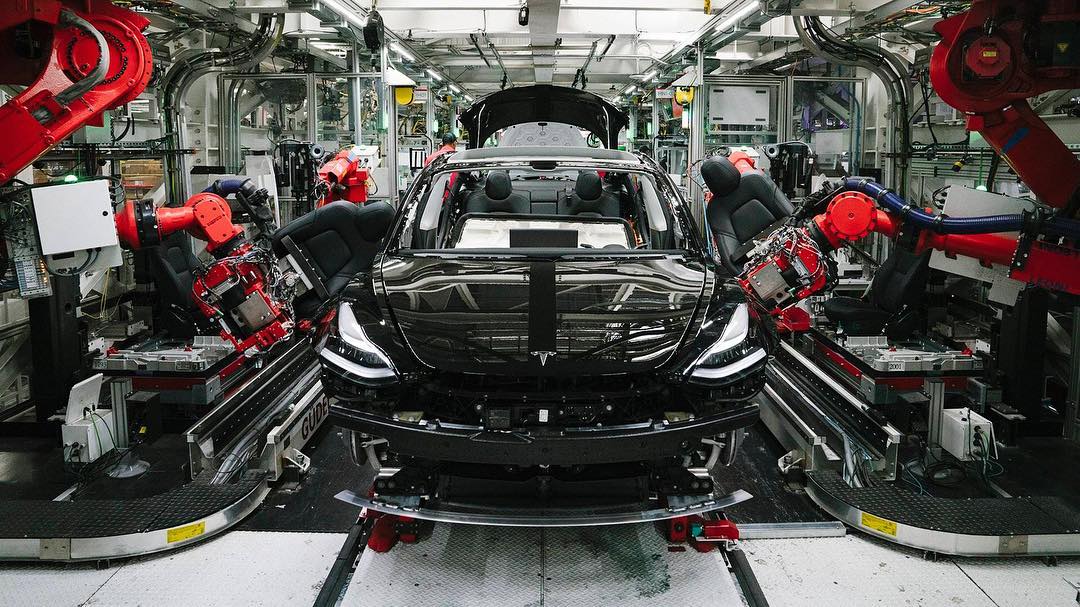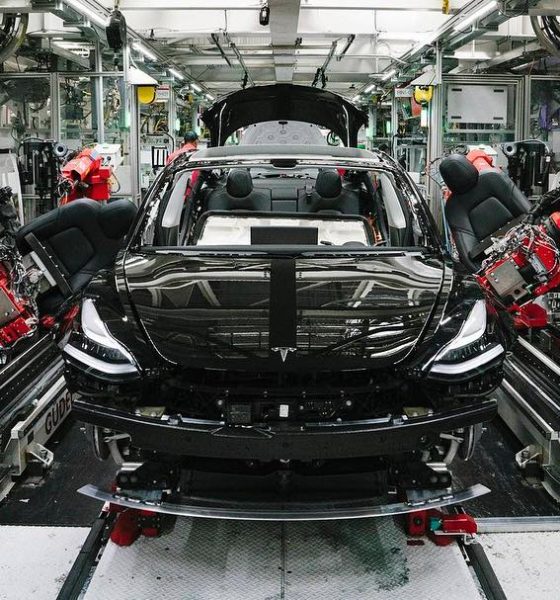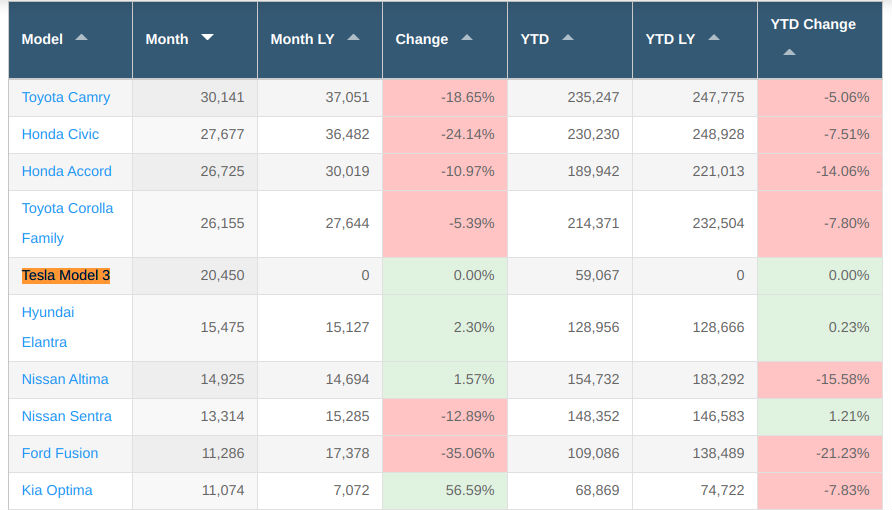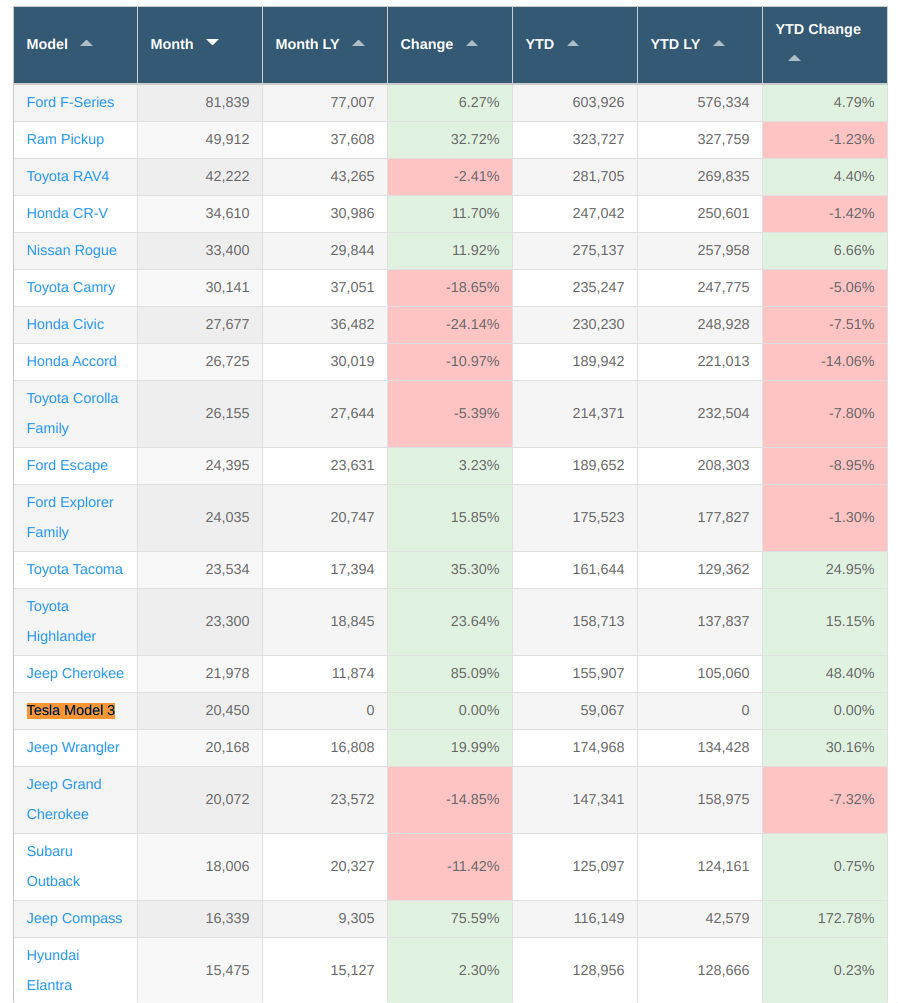

Investor's Corner
Tesla Model 3 becomes August’s 5th best-selling passenger car, 15th in US’ overall auto sales
Tesla took longer than expected to ramp the production of the Model 3, but now the company is finally hitting its manufacturing stride, and the electric sedan is starting to make waves in the US auto industry — some very serious waves.
Auto sales tracking website GoodCarBadCar has posted the estimated sales figures of car manufacturers currently operating in the United States in August. Based on their August 2018 data, the Tesla Model 3 has become America’s 5th best-selling passenger car. The electric car’s rankings for August is up two places from its rank in July, when the Model 3 was listed as the 7th best-selling passenger car in the US.
The auto sales tracking website now lists the Model 3 directly behind the big four of the US passenger car segment — the Toyota Camry, the Honda Civic, the Honda Accord, and the Toyota Corolla Family — all of which are lower-priced than the electric car. The Model 3’s strong August sales figures allowed it to overtake two more affordable vehicles in GCBC‘s rankings as well, the Hyundai Elantra and the Nissan Altima.

The Tesla Model 3 is not just establishing itself as a formidable competitor in the US’ passenger car market, either. The Model 3 also made it to the Top 20 of GoodCarBadCar‘s overall rankings for US auto sales, which include SUVs and trucks such as the best-selling Ford F-150, the Dodge RAM, the Toyota Rav4, and the Honda CR-V. So far, the Model 3 is 15th on the overall list for August, beating out popular SUVs such as the Jeep Wrangler, Jeep Grand Cherokee, and the Subaru Outback.
The Model 3’s estimated August sales are quite impressive, considering that Tesla is still in the process of ramping the production of the electric car. Tesla, after all, plans to eventually build 10,000 Model 3 per week, and so far, the company is only producing around half of that number weekly.

Tesla ended Q2 2018 on a strong note, producing 5,000 Model 3 vehicles in a seven-day period. Despite this milestone, the company’s critics are highly skeptical that Tesla would be able to maintain its optimum production numbers. That said, over the first two months of Q3, Tesla appears to have taken it upon itself to prove its critics wrong.
During the Q2 2018 earnings call, Elon Musk mentioned that Tesla was able to maintain a production rate of 5,000 Model 3 per week during “multiple weeks” in July. In August, the company also showed encouraging signs about the electric car’s production. Tesla’s VIN registrations for the Model 3, for one, rocketed past the 100,000-vehicle mark, and Bloomberg‘s online Model 3 production tracker even showed a week where the company seemed to have produced more than 6,000 units of the electric sedan in a seven-day period.
Perhaps the most notable vote of confidence for the company’s Model 3 production ramp came from veteran auto analyst George Galliers from Evercore ISI, who was given an extensive tour of the Fremont factory, including the newly built GA4 set up on the grounds of the facility. The analyst later published a report about his visit, noting that Tesla is well on its way to sustaining a weekly production rate of 5,000-6,000 Model 3 per week.
“Tesla seems well on the way to achieving a steady weekly production rate of 5,000 to 6,000 units per week. We are incrementally positive on Tesla following our visit. We have confidence in their production. We did not see anything to suggest that Model 3 cannot reach 6k units per week and 7k to 8k with very little incremental capital expenditure. Focusing on the fundamentals and setting aside talk of privatization, we are incrementally positive on Tesla following our visit,” Galliers noted.

Elon Musk
Tesla stock gets latest synopsis from Jim Cramer: ‘It’s actually a robotics company’
“Turns out it’s actually a robotics and Cybercab company, and I want to buy, buy, buy. Yes, Tesla’s the paper that turned into scissors in one session,” Cramer said.

Tesla stock (NASDAQ: TSLA) got its latest synopsis from Wall Street analyst Jim Cramer, who finally realized something that many fans of the company have known all along: it’s not a car company. Instead, it’s a robotics company.
In a recent note that was released after Tesla reported Earnings in late January, Cramer seemed to recognize that the underwhelming financials and overall performance of the automotive division were not representative of the current state of affairs.
Instead, we’re seeing a company transition itself away from its early identity, essentially evolving like a caterpillar into a butterfly.
The narrative of the Earnings Call was simple: We’re not a car company, at least not from a birds-eye view. We’re an AI and Robotics company, and we are transitioning to this quicker than most people realize.
Tesla stock gets another analysis from Jim Cramer, and investors will like it
Tesla’s Q4 Earnings Call featured plenty of analysis from CEO Elon Musk and others, and some of the more minor details of the call were even indicative of a company that is moving toward AI instead of its cars. For example, the Model S and Model X will be no more after Q2, as Musk said that they serve relatively no purpose for the future.
Instead, Tesla is shifting its focus to the vehicles catered for autonomy and its Robotaxi and self-driving efforts.
Cramer recognizes this:
“…we got results from Tesla, which actually beat numbers, but nobody cares about the numbers here, as electric vehicles are the past. And according to CEO Elon Musk, the future of this company comes down to Cybercabs and humanoid robots. Stock fell more than 3% the next day. That may be because their capital expenditures budget was higher than expected, or maybe people wanted more details from the new businesses. At this point, I think Musk acolytes might be more excited about SpaceX, which is planning to come public later this year.”
He continued, highlighting the company’s true transition away from vehicles to its Cybercab, Optimus, and AI ambitions:
“I know it’s hard to believe how quickly this market can change its attitude. Last night, I heard a disastrous car company speak. Turns out it’s actually a robotics and Cybercab company, and I want to buy, buy, buy. Yes, Tesla’s the paper that turned into scissors in one session. I didn’t like it as a car company. Boy, I love it as a Cybercab and humanoid robot juggernaut. Call me a buyer and give me five robots while I’m at it.”
Cramer’s narrative seems to fit that of the most bullish Tesla investors. Anyone who is labeled a “permabull” has been echoing a similar sentiment over the past several years: Tesla is not a car company any longer.
Instead, the true focus is on the future and the potential that AI and Robotics bring to the company. It is truly difficult to put Tesla shares in the same group as companies like Ford, General Motors, and others.
Tesla shares are down less than half a percent at the time of publishing, trading at $423.69.
Elon Musk
Tesla to a $100T market cap? Elon Musk’s response may shock you

There are a lot of Tesla bulls out there who have astronomical expectations for the company, especially as its arm of reach has gone well past automotive and energy and entered artificial intelligence and robotics.
However, some of the most bullish Tesla investors believe the company could become worth $100 trillion, and CEO Elon Musk does not believe that number is completely out of the question, even if it sounds almost ridiculous.
To put that number into perspective, the top ten most valuable companies in the world — NVIDIA, Apple, Alphabet, Microsoft, Amazon, TSMC, Meta, Saudi Aramco, Broadcom, and Tesla — are worth roughly $26 trillion.
Will Tesla join the fold? Predicting a triple merger with SpaceX and xAI
Cathie Wood of ARK Invest believes the number is reasonable considering Tesla’s long-reaching industry ambitions:
“…in the world of AI, what do you have to have to win? You have to have proprietary data, and think about all the proprietary data he has, different kinds of proprietary data. Tesla, the language of the road; Neuralink, multiomics data; nobody else has that data. X, nobody else has that data either. I could see $100 trillion. I think it’s going to happen because of convergence. I think Tesla is the leading candidate [for $100 trillion] for the reason I just said.”
Musk said late last year that all of his companies seem to be “heading toward convergence,” and it’s started to come to fruition. Tesla invested in xAI, as revealed in its Q4 Earnings Shareholder Deck, and SpaceX recently acquired xAI, marking the first step in the potential for a massive umbrella of companies under Musk’s watch.
SpaceX officially acquires xAI, merging rockets with AI expertise
Now that it is happening, it seems Musk is even more enthusiastic about a massive valuation that would swell to nearly four-times the value of the top ten most valuable companies in the world currently, as he said on X, the idea of a $100 trillion valuation is “not impossible.”
It’s not impossible
— Elon Musk (@elonmusk) February 6, 2026
Tesla is not just a car company. With its many projects, including the launch of Robotaxi, the progress of the Optimus robot, and its AI ambitions, it has the potential to continue gaining value at an accelerating rate.
Musk’s comments show his confidence in Tesla’s numerous projects, especially as some begin to mature and some head toward their initial stages.
Elon Musk
Tesla director pay lawsuit sees lawyer fees slashed by $100 million
The ruling leaves the case’s underlying settlement intact while significantly reducing what the plaintiffs’ attorneys will receive.

The Delaware Supreme Court has cut more than $100 million from a legal fee award tied to a shareholder lawsuit challenging compensation paid to Tesla directors between 2017 and 2020.
The ruling leaves the case’s underlying settlement intact while significantly reducing what the plaintiffs’ attorneys will receive.
Delaware Supreme Court trims legal fees
As noted in a Bloomberg Law report, the case targeted pay granted to Tesla directors, including CEO Elon Musk, Oracle founder Larry Ellison, Kimbal Musk, and Rupert Murdoch. The Delaware Chancery Court had awarded $176 million to the plaintiffs. Tesla’s board must also return stock options and forego years worth of pay.
As per Chief Justice Collins J. Seitz Jr. in an opinion for the Delaware Supreme Court’s full five-member panel, however, the decision of the Delaware Chancery Court to award $176 million to a pension fund’s law firm “erred by including in its financial benefit analysis the intrinsic value” of options being returned by Tesla’s board.
The justices then reduced the fee award from $176 million to $70.9 million. “As we measure it, $71 million reflects a reasonable fee for counsel’s efforts and does not result in a windfall,” Chief Justice Seitz wrote.
Other settlement terms still intact
The Supreme Court upheld the settlement itself, which requires Tesla’s board to return stock and options valued at up to $735 million and to forgo three years of additional compensation worth about $184 million.
Tesla argued during oral arguments that a fee award closer to $70 million would be appropriate. Interestingly enough, back in October, Justice Karen L. Valihura noted that the $176 award was $60 million more than the Delaware judiciary’s budget from the previous year. This was quite interesting as the case was “settled midstream.”
The lawsuit was brought by a pension fund on behalf of Tesla shareholders and focused exclusively on director pay during the 2017–2020 period. The case is separate from other high-profile compensation disputes involving Elon Musk.








